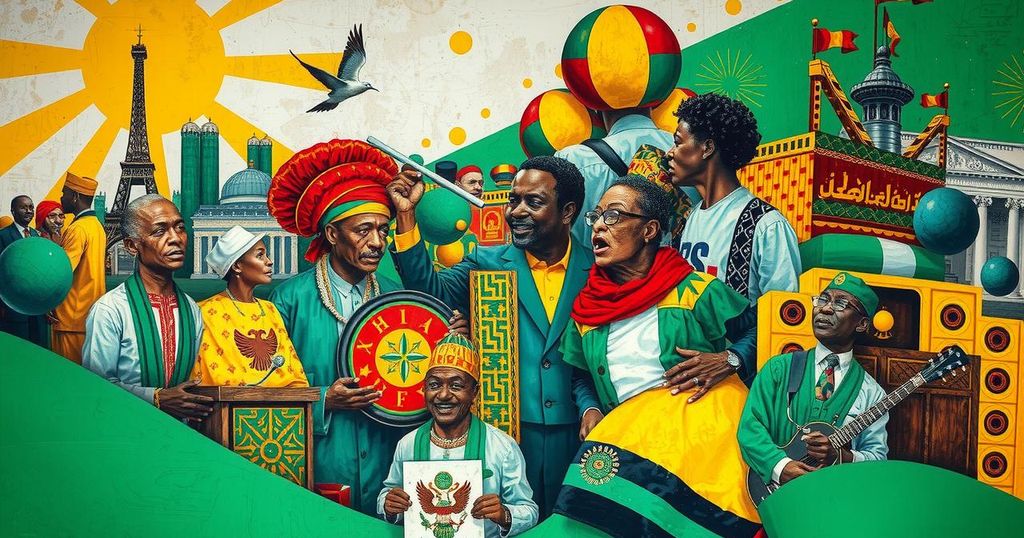Nigeria’s political scene has seen recent turmoil, with clashes among leaders and defection drama raising serious concerns about governance quality. The declaration of a state of emergency in Rivers State, issues around misappropriation of funds, and the shady state of key industries all contribute to a growing sense of disillusionment. The longstanding question “Which way, Nigeria?” is as relevant as ever, prompting calls for change and accountability.
The state of Nigeria’s political landscape continues to evolve with a series of heated events prompting citizens to question the trajectory of their governance. Recent clashes between Senator Natasha Akpoti-Uduaghan and Senate President Godswill Akpabio over a trivial seating arrangement erupted into a full-blown personal spat—what was intended to be a simple plenary session devolved into chaos. This spectacle has opened discussions on the leadership quality in Nigeria, suggesting that personal power struggles overshadow pressing national issues. The senator’s subsequent suspension adds to the bewildering nature of these conflicts.
In tandem with this, President Tinubu declared a state of emergency in Rivers State, leading to the suspension of the governor and other officials for six months. This action was met with legal disputes regarding its legitimacy, as many experts expressed concern over the erosion of democratic principles in favor of unyielding loyalty to leadership. The swift approval by the National Assembly, despite apparent overreach, drew ire from legal scholars and organizations like the Nigerian Bar Association, who labelled it a serious threat to democracy.
Meanwhile, the political scene shifted again as former Kaduna State Governor, Nasir El-Rufai, defected from the ruling APC to the Social Democratic Party, claiming a desire to save the country from the crisis he helped foster. This ironic twist left many skeptics questioning his motivations as El-Rufai’s departure was promoted as an altruistic move, which struck others as mere political maneuvering.
Other states have seen similar patterns, notably in Delta, where government officials transitioned to the APC seeking alignment with the ruling party. This strategy is raising alarms among citizens, with fears that the government is engineering a one-party state. Officials maintain that such claims are politically motivated smokescreens aimed at undermining their expanding influence.
For the average Nigerian, witnessing this continuous political drama might elicit an exclamation of “Omo!”—a sentiment reflecting frustration and disbelief at the unfolding chaos. Yet, amidst the headlines, there are more pressing issues, like the alleged diversion of ₦71.2 billion meant for the Nigeria Education Loan Fund, now the subject of an investigation by the ICPC, although the fund denies any financial discrepancies.
Additionally, there are reports that the Warri Refining and Petrochemical Company remains shut due to safety concerns, counter to earlier assurances from former NNPC leaders about its operational success. The failure of the Port Harcourt Refining Company to operate at full capacity also raises eyebrows, painting a picture of a government that may have misled the public about national progress, which borders on an illusion.
In light of these developments, I find myself compelled to echo a question that resonates through the ages—”Which way, Nigeria?” First coined by Sunny Okposo over 40 years ago, the question reverberates more earnestly today. We see a nation meandering through a cycle of unfulfilled promises and institutional decay, leaving citizens feeling lost and directionless.
Various artists have expressed similar frustrations in their music, articulating a call for accountability and introspection within leadership. Tracks like “Mr President” and “Jaga Jaga,” alongside newer releases like “Talk” by Falz, all underscore the perils of bad governance, corrosive corruption, and ongoing insecurity. These songs serve as urgent calls to action amidst a nation seemingly in distress.
As I reflect on these pressing issues, one question looms larger: When will the Nigeria of our dreams come into being—a country where loyalty to the land outweighs personal interests? It’s time for citizens to consider: How long until unity, truth, and justice flourish? Until these visions start to materialize, the chorus remains steadfast: Which way, Nigeria?
The Nigerian political landscape continues to face enormous challenges characterized by personal power struggles, defection drama, and ongoing corruption. Leaders appear increasingly disconnected from the needs and aspirations of the citizenry, raising questions about the legitimacy of their actions and the health of the nation’s democracy. The cries for change resonate through both political commentary and art, echoing the urgent need for a united direction and a government that prioritizes its people’s welfare over individual agendas. Nigeria finds itself at a critical juncture, and the question still stands: which way forward?
Original Source: www.thisdaylive.com






